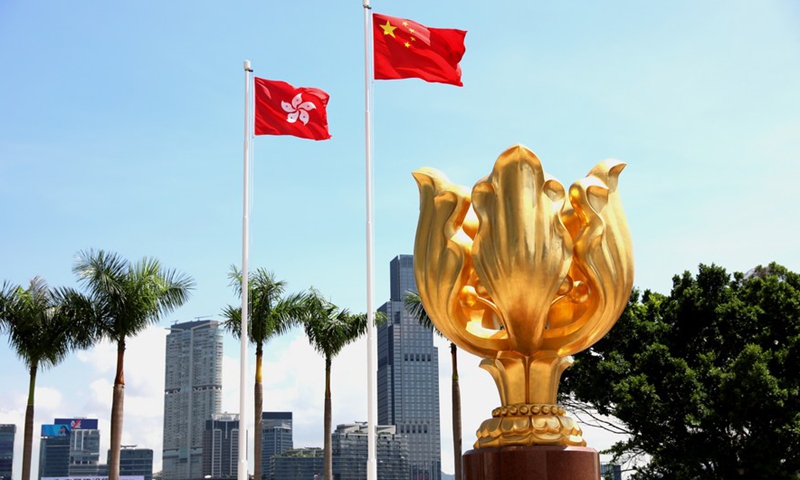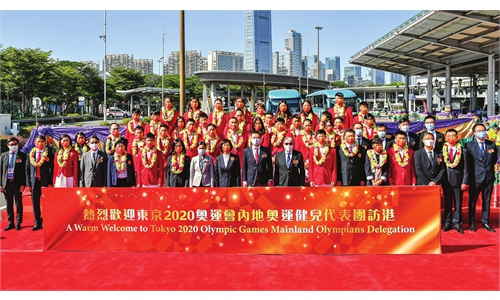Official applauds HK's new electoral system for balancing social interests, promoting democracy
Blindly following Western democracy leads to social disorder, economic imbalance

Photo taken on July 14, 2020 shows the Golden Bauhinia Square in south China's Hong Kong, July 14, 2020. (Xinhua)
Hong Kong's overhauled electoral system balances the interests of the city, and is in accordance with real democracy of Hong Kong, which had been blindly following Western-style democracy for quite a long time, said a top official who oversees Hong Kong affairs in a speech on Monday, ahead of the city's Legislative Council (LegCo) elections on December 19.
Analysts said the official's endorsement of the new electoral system sends a signal to Hong Kong society that the system does not seek to mold a Western style democracy in this city, but a democracy that fits into the context of one country, two systems, and also serves as a rebuttal to the smears and snarls from the West against the city's upcoming LegCo election.
The speech was made by Xia Baolong, Director of the Hong Kong and Macao Affairs Office of China's State Council and Vice-Chairman of the National Committee of the Chinese People's Political Consultative Conference, on Monday.
During the speech, Xia said the new electoral system in the Hong Kong Special Administrative Region (HKSAR) demonstrates broad representation, political inclusiveness, balanced participation and fairness and competitiveness, which balances social interests, promotes democracy and improves governance.
The new electoral system is being put into practice step by step, and a new election committee, which embodies the principle of "patriots governing Hong Kong," is moving smoothly, according to Xia.
On December 19, the HKSAR will hold its Legislative Council election, which was postponed more than a year due to COVID-19.
Xia noted that this is of great significance to the implementation of the principle of "patriots governing Hong Kong," and the election is of great significance to the development of democracy that suits Hong Kong's reality, and the shaping of a new pattern of good governance in Hong Kong.
The new electoral system has attracted more candidates from all walks of life, Xia said. Some are business, academic and professional elites, some are workers and staff from the grassroots, some are native Hongkongers, Putonghua-speakers, people born in the island of Taiwan and naturalized Chinese, according to Xia.
Carrie Lam, Chief Executive of HKSAR, spoke on Monday in response to Xia's remarks. Lam said the improvement to the electoral system aims to implement the fundamental principle of "patriots governing Hong Kong," ensuring that members of the Legislative Council are patriotic and act in the interest of the country's development and the long-term prosperity and stability of Hong Kong.
The HKSAR government hopes to work together and cooperate with members of the new term of the Legislative Council to promote various policies and initiatives to develop the economy and improve livelihoods, ushering in a new era of good governance in Hong Kong, Lam said.
Xia's speech sends a signal to Hong Kong that the new electoral system is to mold a democracy within the context of one country, two systems, instead of Western-style democracy, Tian Feilong, an associate professor at Beihang University's law faculty and a member of the Chinese Association of Hong Kong and Macao Studies, told the Global Times.
The advantages of the new electoral system, which includes representation, fairness and inclusiveness, prevent Hong Kong from stepping into Western democracy, which was extremely concentrated in the elites, avulsion of society, partisan squabbling, and the rise of populism, said Tian.
Democratic models have recently become the focus of a China-US clash when China issued a white paper on its democratic model with details and examples showing how the whole-process democracy with the people's full participation in China works; and another report detailing the abuses and malaise of democracy in the US, days before the convening of the US-initiated democracy summit.
Xia also said in his speech that for quite a long time, Hong Kong has blindly followed Western-style democracy, which creates a divided Hong Kong society, and infighting, which leads to social disorder, an imbalance in the economy and uncontrolled crises.
Responding to criticism from Western countries of Hong Kong's upcoming election, Xia said that some people in the international community, in disregard of the facts, wantonly smear and slander Hong Kong's electoral system, which only exposes their ignorance, arrogance and prejudice, Xia said, noting such people are not the "top students" in the democracy classroom, and are not qualified to be "teachers."
The Wall Street Journal published a letter written by Secretary for Constitutional and Mainland Affairs Erick Tsang Kwok-wai. The letter says that Hong Kong government reserves the right to take necessary action as an earlier Wall Street Journal editorial contains baseless assumptions and incites Hong Kong voters not to vote or to cast an invalid one.
Experts also pointed out that the development of Hong Kong's democratic practice is also an important section of the country's exploration of democracy. "Xia's speech has highlighted our confidence in our democratic model. Hong Kong's new electoral system is also suited to Hong Kong's development, which should not be viewed by outsiders and foreign forces with prejudice and arrogance," said an anonymous expert on Hong Kong affairs.
In an exclusive interview with the Global Times on Friday, Lam said that the LegCo election will be the one with the largest scale in the three important elections - the one for Election Committee, the one for LegCo and the one for electing the Chief Executive of the HKSAR government.
"More than 4 million registered voters will elect 90 LegCo members, and through the electoral reform, it's becoming much more representative with more balanced participation, as we can see the background, age and profession of the candidates are diverse. I expect that the LegCo election will achieve the goal set by the electoral reform - to elect those who are patriotic to govern the city, safeguarding the Basic Law and the HKSAR government," she said.
It's not the "all-same-unit" election, as the 153 candidates have different political backgrounds. Some are from the pro-establishment camp and others are not, and some may belong to the pan-democracy camp, according to Lam.

